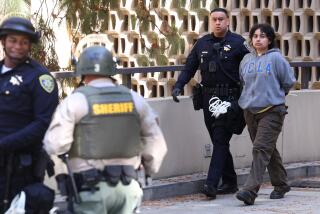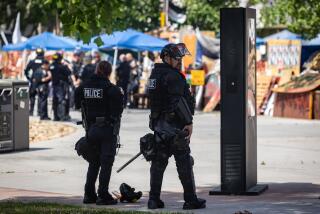Will Occupy be heard from?
- Share via
Whatever happened to Occupy Wall Street? Are you folks still out there? Yes, the economy seems to be improving and thus the power of your message has been slightly blunted. But as a political force that could rally the nation on behalf of the 99%, who tend not to contribute huge sums to campaigns and so have less influence than their numbers deserve, you’re still badly needed.
In Los Angeles and nationwide, there are still sputtering signs that the Occupy movement hasn’t disappeared. Last week, activists held demonstrations on about 30 college campuses in California, including Cal State Los Angeles and Cal State Long Beach, to protest state cuts to higher education. On Monday they moved their act to Sacramento, where assorted student groups and public employee labor unions staged an “Occupy the Capitol” event that attracted thousands of people decrying education cuts and backing a measure slated for the November ballot that would tax millionaires to support state services. Whether such student rallies constitute “genuine” Occupy events is tough to say, because at this point any interest group challenging the status quo can adopt the Occupy label.
That’s OK — something similar happened to the tea party movement, and that didn’t prevent it from being a force to be reckoned with in the 2010 elections — but it’s still hard to escape the feeling that since Occupy activists were kicked out of their encampments across the country this winter, the group has lost a good deal of momentum as well as what little organizational coherence it possessed.
An example of the problem cropped up in late February, when attorney Michael Pollok, founder of the 99% Declaration Working Group and a self-appointed movement leader, announced a national Occupy Wall Street conference in Philadelphia the week of July 4 that would pick delegates from 50 states and draft a petition to present to the president and Congress. That idea was speedily pooh-poohed by Han Shan of the Occupy Wall Street public relations working group, who said the movement wasn’t endorsing the conference.
Other Occupy leaders say they’re planning big protests during the Group of Eight economic conference in May. And there are of course splinter groups all over the country holding regular demonstrations at banks and city halls. But 2012 is an election year that presents a sharp contrast between candidates who aim to help level the playing field dominated by the 1% and those who don’t. If the Occupy movement is to have much influence over that contest, it will probably have to do something its leaders have so far resisted: get organized.
More to Read
A cure for the common opinion
Get thought-provoking perspectives with our weekly newsletter.
You may occasionally receive promotional content from the Los Angeles Times.






